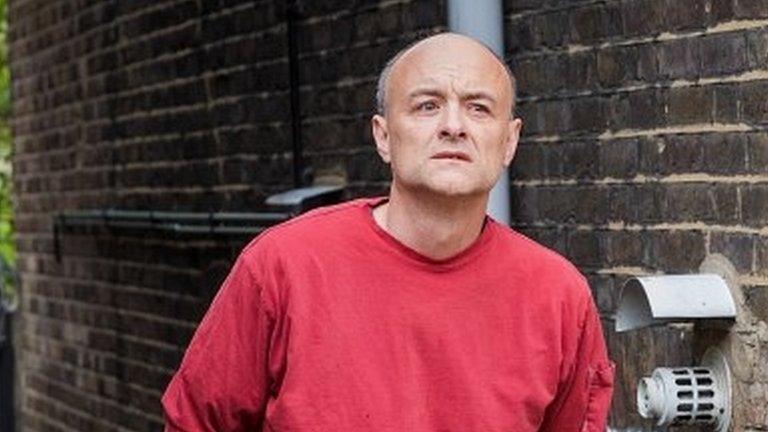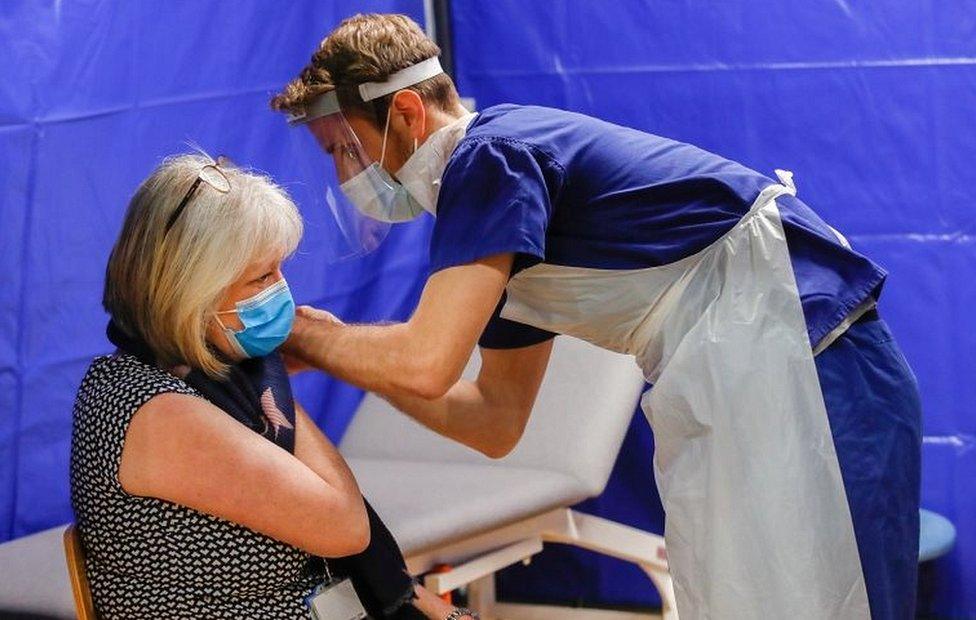Covid: Dominic Cummings accuses government of secrecy
- Published

Dominic Cummings has claimed that government "secrecy" in its handling of the Covid crisis "contributed greatly to the catastrophe".
The prime minister's former adviser tweeted that its performance had been "part disaster, part non-existent".
Mr Cummings, who will appear before a committee of MPs next week, also called for more scrutiny of policy to ensure the Indian variant is dealt with.
The government said it was always guided by the "best scientific data".
This had "allowed us to secure early development of vaccines", a spokesman added.
More than 127,000 people diagnosed with coronavirus have died in the UK since the start of the pandemic, but 36.7 million people have now received a first vaccine dose.
According to the government's "roadmap", the remaining restrictions on social contact in England are set to end on 21 June.
In a series of tweets Mr Cummings posted, apparently while in the waiting room for his first Covid jab, he attacked his former colleagues in government and the Civil Service (abbreviations he used have been turned into full words here).
Looking back at the start of the pandemic last year, he wrote: "One of the most fundamental and unarguable lessons of February to March is that secrecy contributed greatly to the catastrophe.
"Openness to scrutiny would have exposed government errors weeks earlier than happened."
Mr Cummings claimed he and the UK government's chief scientific adviser, Sir Patrick Vallance, had "supported opening up" the Sage committee - the scientists who advise ministers on handling emergencies - earlier to greater scrutiny.
He wrote that delaying the release of its minutes until late May last year had been due to a "cultural hostility to openness" in Whitehall.
And "human challenge" trials, where individuals are deliberately infected with the the virus, should have begun as soon as it was detected in the UK, he added.
This could have meant "jabs in arms" by last summer, Mr Cummings argued.
Mr Cummings quit his government job after a Downing Street power struggle in the autumn, and has been critical of the government since his departure.
He is expected to express further thoughts when he appears before the Commons Health and Social Care Committee and Science and Technology Committee - holding a joint inquiry into "lessons learnt" about coronavirus - on 26 May.

More than 36.7 million people in the UK have had a first Covid jab
Covid restrictions eased in England, whose health policy is overseen by the UK government, on Monday, but there are concerns about the spread of the Indian variant.
It is feared this could be 50% more transmissable than the UK-originated strain involved in the deadly second wave of infections this winter, although this claim is still being investigated.
Mr Cummings urged MPs to push the government for details on how variants are to be tackled with vaccines, writing: "The best hedge re: a variant escaping current vaccines is PUBLIC SCRUTINY of government plans.
"This will hopefully show it's been taken seriously. If not, better learn now that the government has screwed up again than when 'variant escapes' news breaks."
He also called for a review of contingency plans to prepare for "more dangerous things than Covid" in the future.
'Early development'
On a visit to a vaccination centre in London, Mr Johnson said there was "nothing conclusive" in the available data which might change plans to end restrictions on 21 June.
But information from Indian variant hotspots, including Bolton, and elsewhere was being analysed, meaning the situation would remain "under close review".
The prime minister's official spokesman said the government's "approach to the pandemic throughout" had been "guided by the best scientific data".
This had "allowed us to secure early development of vaccines, allowing us to move through" the easing of restrictions, he added.
Asked about what Mr Cummings might tell MPs next week, the spokesman also said he would "not speculate about what individuals may have and may or may not decide to present".
Scotland and Wales, like England, eased Covid restrictions on Monday, while Northern Ireland is set to do so next Monday.
These changes will be subject to review.